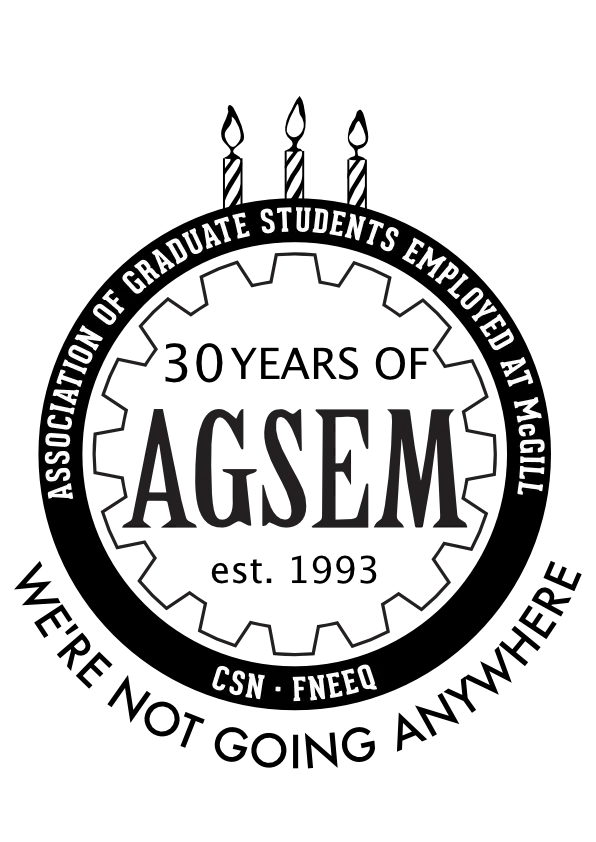Exhibit 3 - AGSEM Matures–2003 and 2008 Strikes
Location of physical exhibit: Take the staircase or elevator to the 4th floor of Arts West. The AGSEM bulletin board for Art History and Communication Studies is located in the hallway to the right, past the double doors and towards the AHCS offices.
The first TA Collective Agreement of the Association of Graduate Students at McGill (AGSEM) was in force from January 1, 1998 until May 31, 2001. This document had taken over four years to negotiate. Negotiations for the second contract went relatively quickly. Still, AGSEM and the employer reached an impasse over wages, which were one of the major limitations of the first contract. AGSEM TAs, who were being paid between $14.59 and $18.49 per hour, were demanding $22 per hour for all. McGill’s counteroffer was between $17.68 and $19.24. In comparison, the national average for unionized TAs at this point was $24.42.
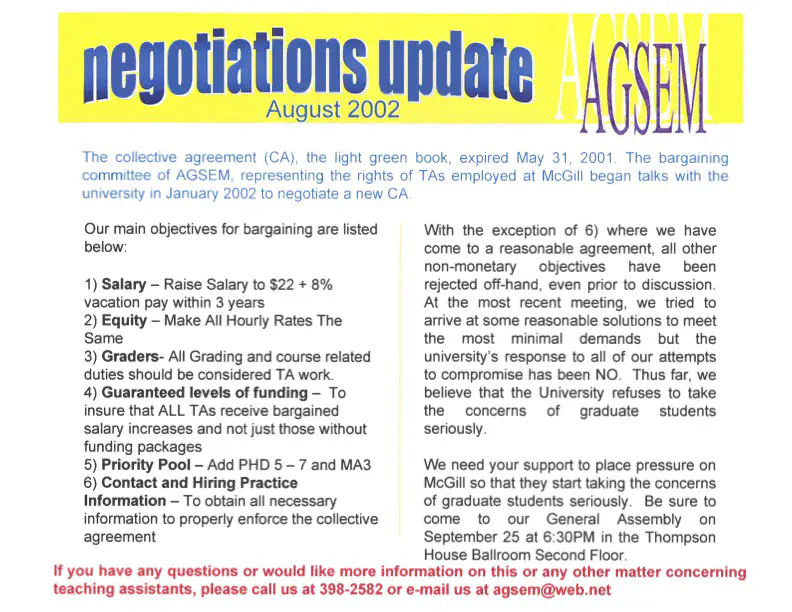
“Negotiations Update,” AGSEM Newsletter (August 2002). AGSEM Archives, Vol. 4.1 “Miscellaneous Flyers and Booklets.”
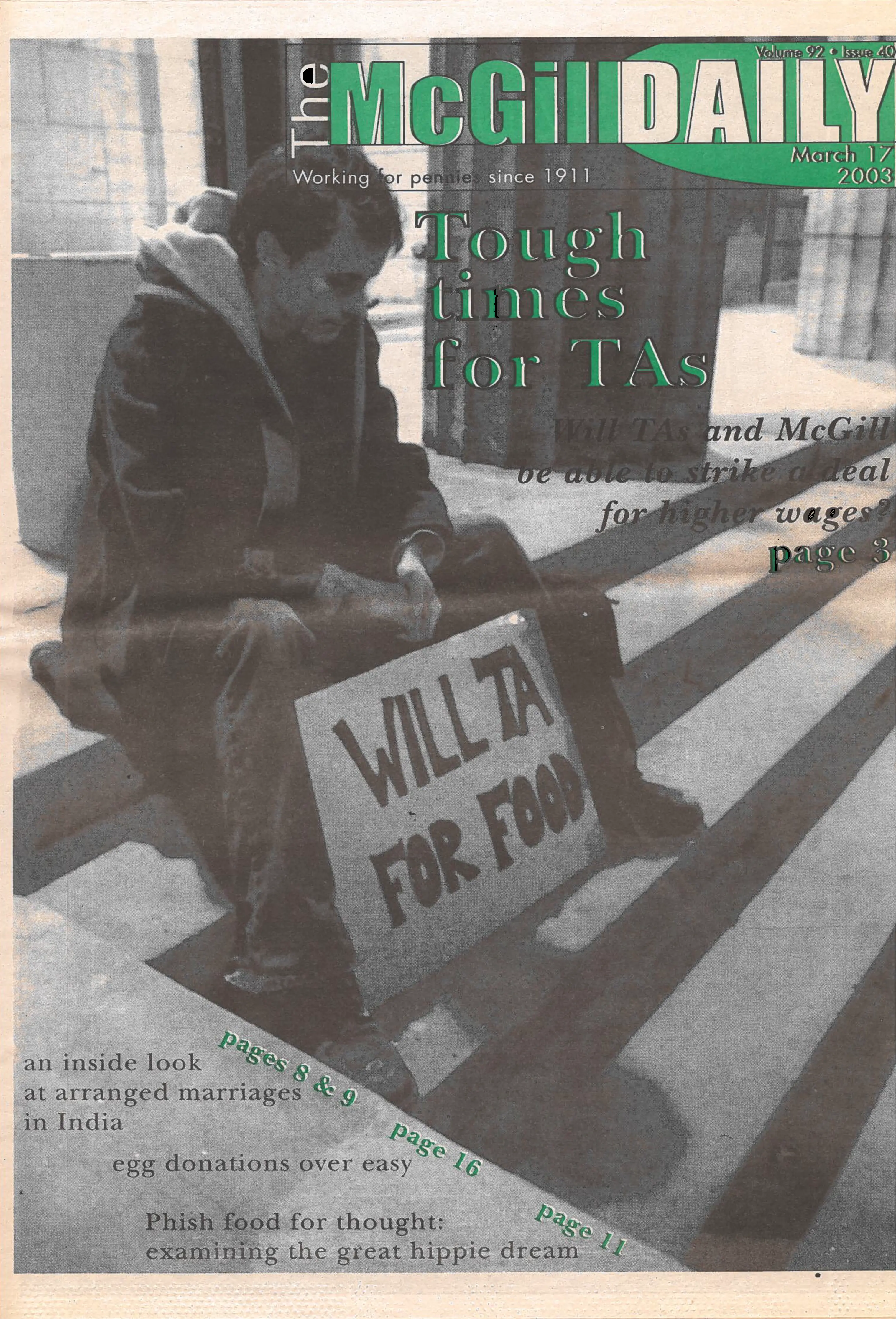
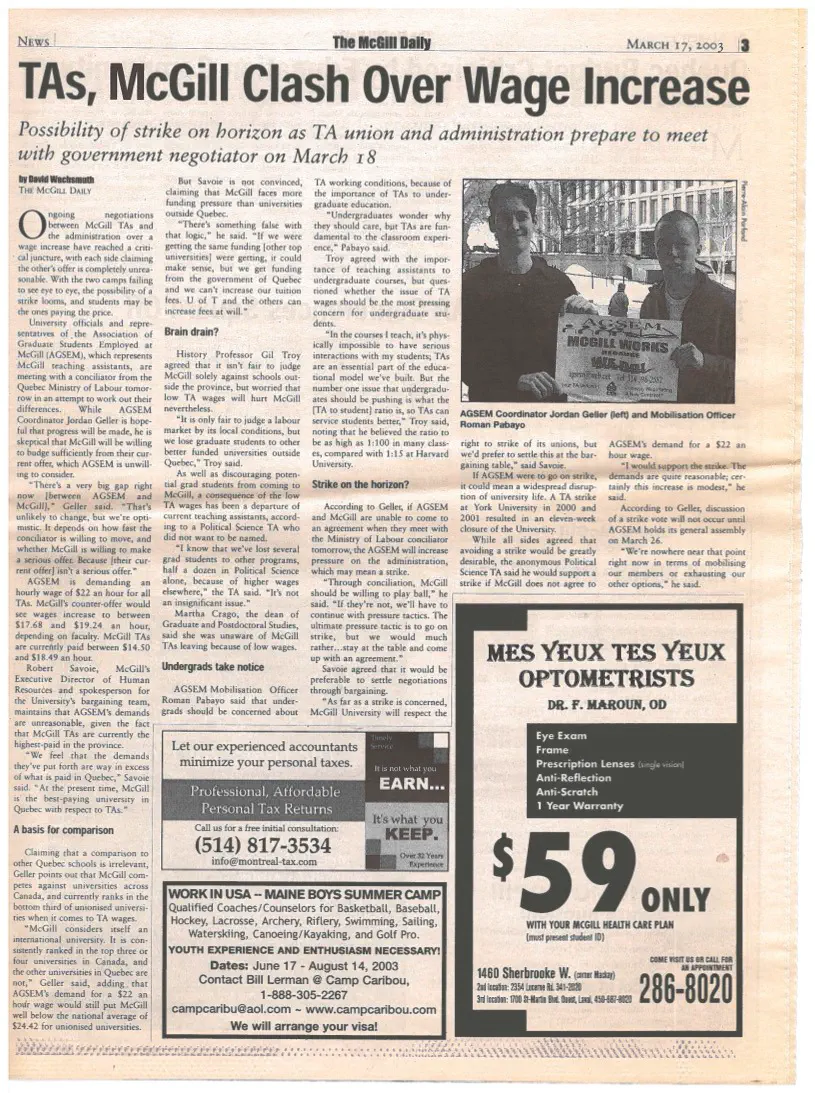
“Tough times for TAs,” Cover page of The McGill Daily, Vol. 92 No. 40 (March 2003). AGSEM Archives, Vol. 4.1 “‘Tough times for TAs’ McGill Daily.”
With negotiations stalling, AGSEM held a favourable strike vote at a General Assembly in March 2003. The threat of strike did not sweeten the deal enough, so on April 24, 2003, 900 McGill TAs went on a general unlimited strike. Throughout the strike, both sides continued meeting with a conciliator appointed by the Labour Board to resolve the deadlock between AGSEM and the employer on monetary issues. In early May 2003, the conciliator presented a non-binding recommendation to both parties.



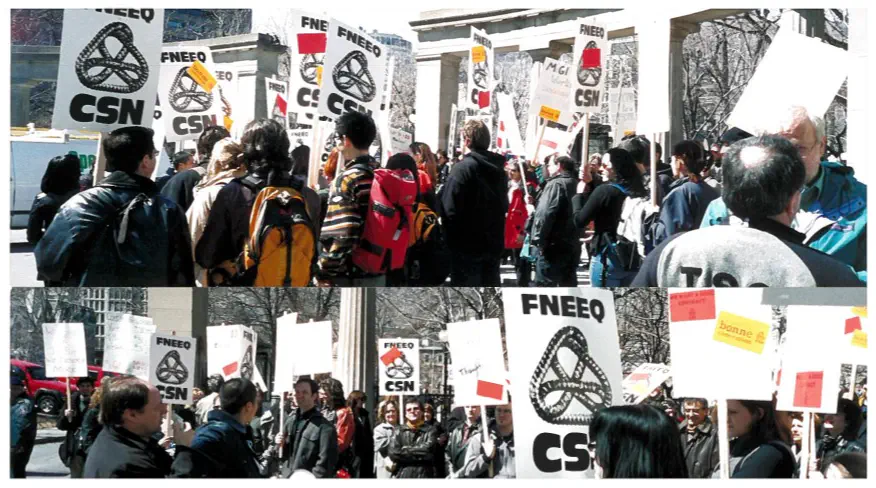
AGSEM members picket Roddick Gates during the 2003 strike. AGSEM Archives, Vol. 4.1 “AGSEM Strike Photos.”
![“More [than] 900 McGill staff on strike,” Unité Digest (May 2003). AGSEM Archives, Vol. 4.1 “2003 Strike in the Press.”](/images/AGSEM%20anniversary/Exhibit%203/3.3_hud0ef95d60cbc96353b6c36d6573371b3_192299_0x0_q75_h2_.webp)
“More [than] 900 McGill staff on strike,” Unité Digest (May 2003). AGSEM Archives, Vol. 4.1 “2003 Strike in the Press.”
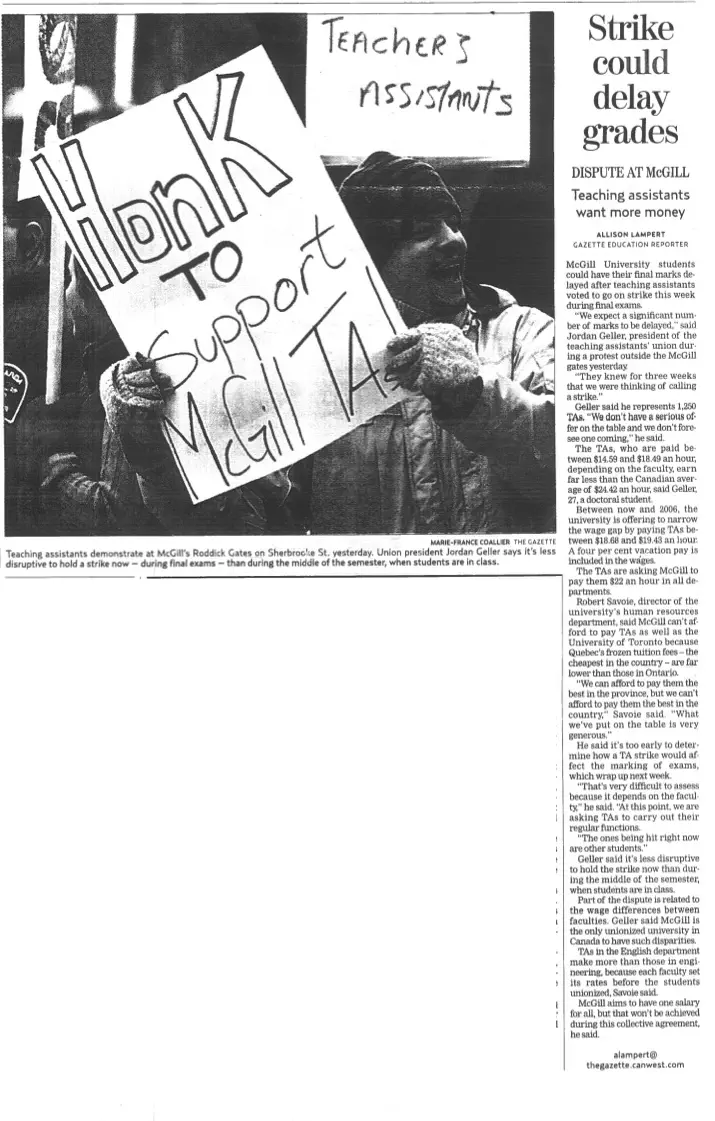
“Strike could delay grades,” Montreal Gazette (n.d.). AGSEM Archives, Vol. 4.1 “2003 Strike in the Press.”
In a General Assembly on May 8, TAs agreed to the conciliator’s recommendation and a return to work. The settlement included an immediate wage increase to $16.92-19.76 in Fall 2003 and $18.16-20.35 in Winter 2004. In this second TA contract, the longstanding issue of pay equity across departments was reached by 2006. The second collective agreement also established that any additional work for a course would be offered TAs first at the TA rate before it may be offered to graders and that overtime pay shall be granted upon agreement with the Chair of a department. These wins over contentious monetary issues once again proved that strikes work. This was the first of two strikes that shook the first decade of the twenty-first century.
The 2003 collective agreement left several important matters unresolved. In preparing for the next round of bargaining which would begin in 2007, TAs raised concerns about working more hours than they were being paid, and that salaries still lagged far behind those of TAs at universities in Ottawa and Toronto. From April to June 2008, AGSEM went on a very difficult eleven-week strike demanding better wages and improved working conditions. Central to the union’s demands in 2008 was the creation of a Workload Form that would protect TAs from vague tasks and overwork. At the time, it was one of the longest graduate employee strikes in North America.
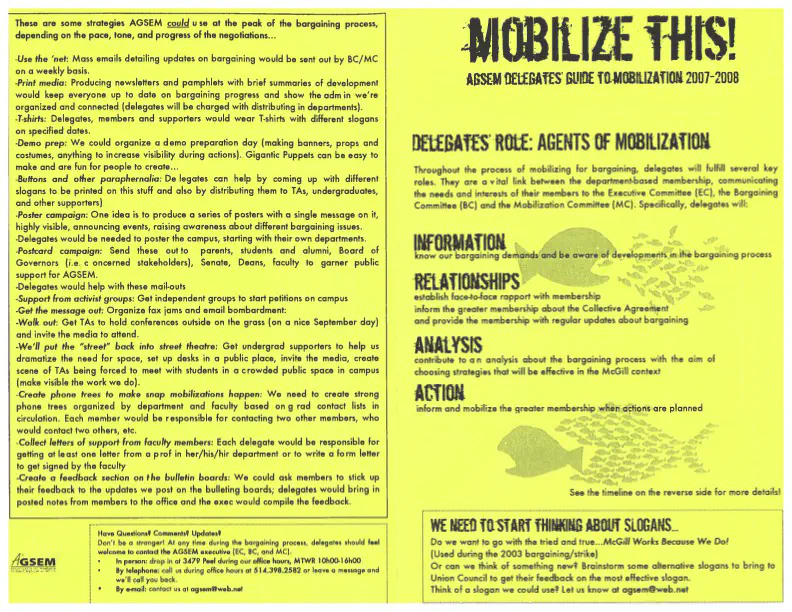
“Mobilize This! AGSEM Delegates’ Guide to Mobilization 2007-2008.” AGSEM Archives, Vol. 3.1 “Your Child’s TA Is On Strike.”

AGSEM poster advertising a TA demonstration (March 2008). AGSEM Archives, Vol. 4.1 “Flyers, TA Strike.”



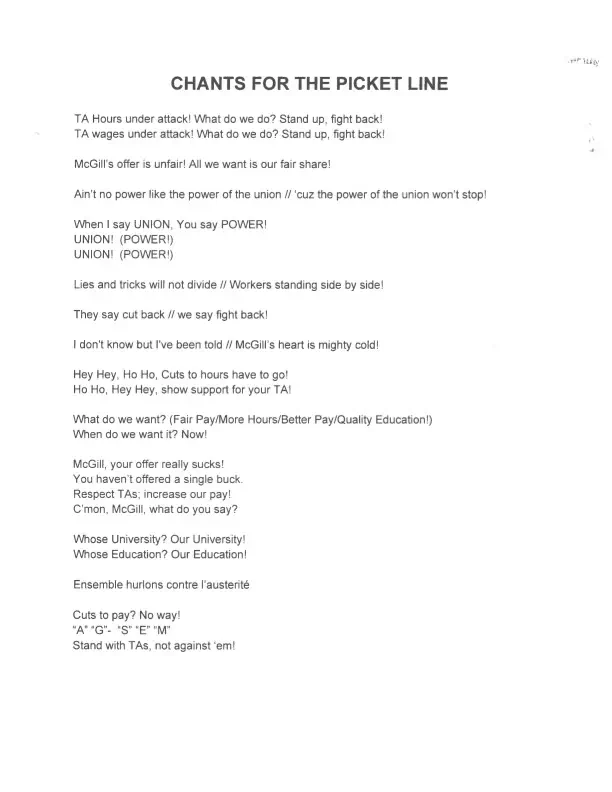
“Chants for the picket line” handout (n.d.). AGSEM Archives, Vol. 4.1 “Flyers, TA Strike.”
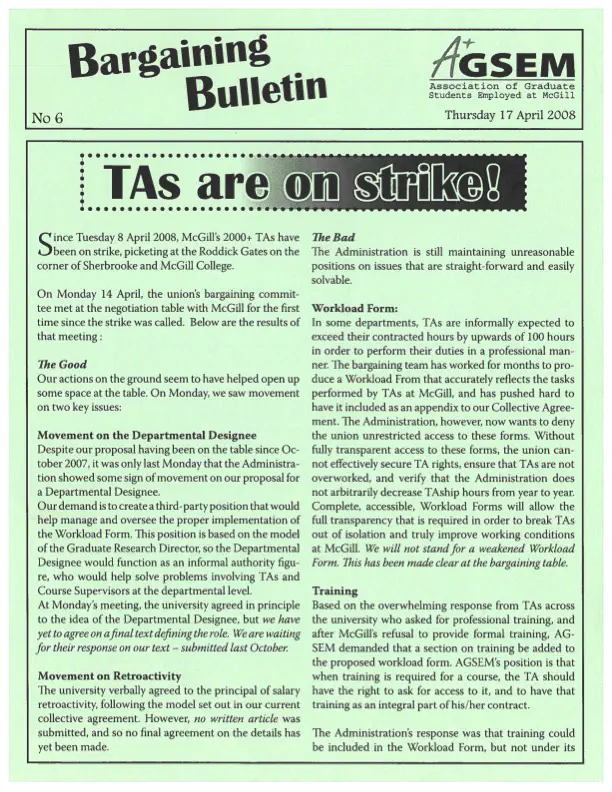
“TAs are on strike!” AGSEM Bargaining Bulletin (April 2008). AGSEM Archives, Vol. 3.1 “Bargaining and Strike Documents Distributed Widely.”
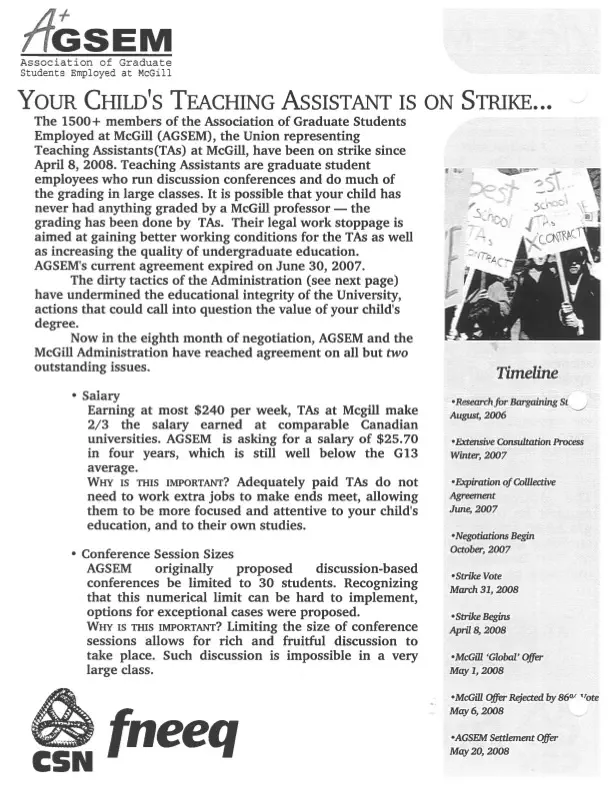
“Your child’s Teaching Assistant is on strike…McGill Admin could make the strike end,” AGSEM pamphlet (n.d.). AGSEM Archives, Vol. 3.1 “Your Child’s TA Is On Strike.”
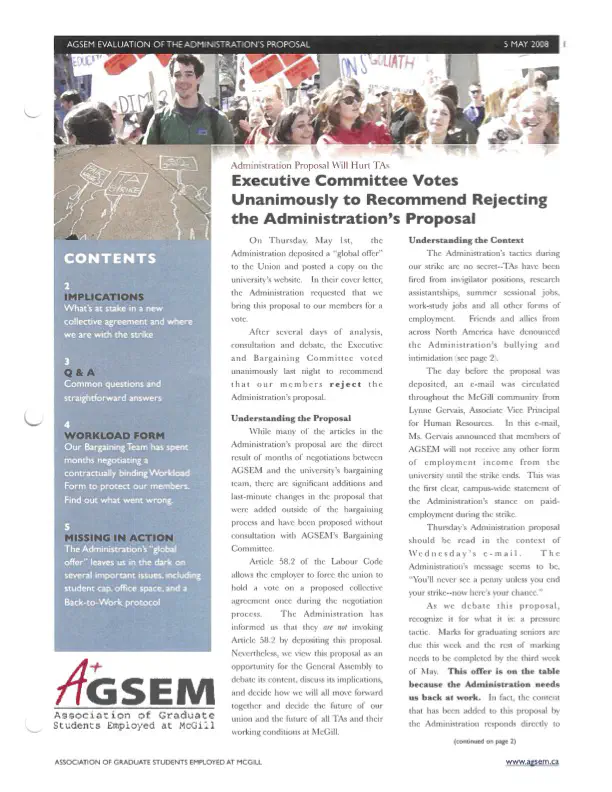
“AGSEM Evaluation of the Administration’s Proposal,” AGSEM Newsletter (May 2008). AGSEM Archives, Vol. 3.1 “‘2008 Bargaining Bulletins and Newsletters.”
“We fought long and hard for the terms of our new collective agreement and it reflects a vast improvement in our working conditions. For us, today’s signing underscores the power of unionized teaching staff and what we can achieve together through collective bargaining—and, when necessary, withholding our labour.”
—Press release, Richard Hink, AGSEM President, July 2008.
The strike succeeded in forcing important concessions from McGill. On July 22, 2008, AGSEM and McGill signed the final text of their third collective agreement, a month after they voted to end an eleven-week strike for better working conditions. While not accomplishing everything, the 2008 TA strike won very important rights for TAs. The new agreement included better wages; improved conference, bereavement and sick leave; protections that safeguard intellectual property and provide recourse to sexual and psychological harassment; paid training, equipment and supplies; additional resources for the union and a mandatory Workload Form that prevents unpaid overtime and clearly defines the tasks assigned to the employee. This Collective Agreement was in duration until 30 June 2011.
“I think that came out of 2008. That was Rick’s thing: the workload form. And that was a big thing, because at least you got a recognition that there are different tasks that you’re doing and they need to be accounted for and the AO’s [administrators] had to be trained on using the workload form. And if you didn’t have [the workload form], you could get a grievance out of that.”
—Interview with Lerona Lewis, AGSEM President (2008-12).
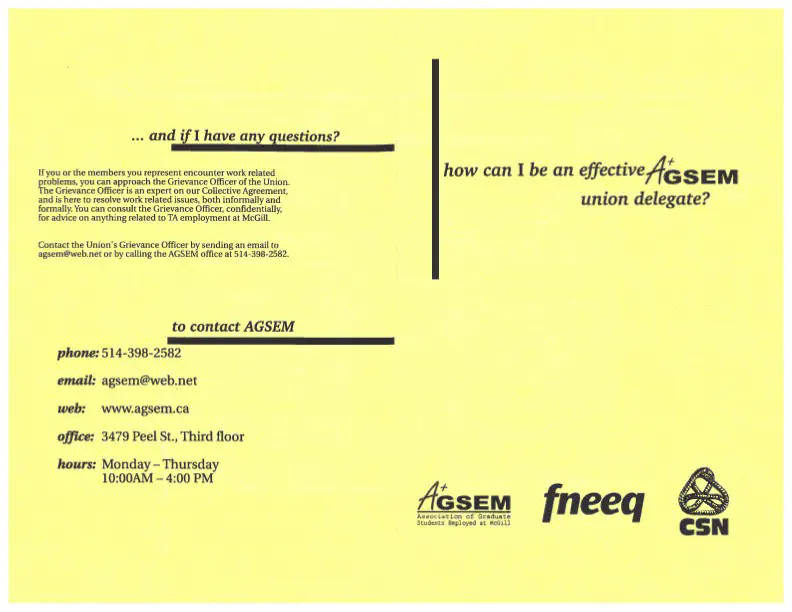
AGSEM delegate manual (n.d.). AGSEM Archives, Vol. 5.2 “Delegate Information 2007-2008.”
The next round of negotiations in Fall 2011 were primarily over monetary demands. These negotiations were resolved quickly, only lasting from shortly after the expiration of the third TA Collective Agreement until 20 December 2011. TA negotiations for the third Collective Agreement were expedited for a very important strategic reason: AGSEM was in negotiations for two other employee groups, invigilators and course lecturers.
